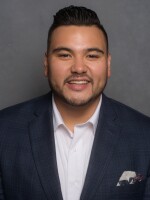Pro-Palestinian demonstrators filled Cleveland City Council's chambers once again Monday with a new tactic to urge for a Gaza ceasefire resolution without getting removed from the meeting.
Last month, council implemented a new six-step protocol for city council meeting disruptions, drafted by the public safety committee with the guidance of the city's law department.
On Monday, the demonstrators pushed the limits of the new protocol.
After the public comment portion of the meeting, protesters started chanting loudly in council chambers. Using his microphone and gavel, Council President Blaine Griffin urged protesters to stop. Before he could deploy the new protocol which allows council to call a recess, clear the chambers and resume the meeting, the protestors filed into a hallway and continued to loudly protest just outside the chamber doors.
“I think that our organizing skills is something incredible, and I don’t think that they’ll ever be able now to slow us down," said demonstrator Jenna Muhieddine, of Lakewood. "I think we’ve reached a point where we’re going to keep going until we get the ceasefire.”
Meeting attendees struggled to hear over the chants coming from the hallway. During council business, some council members left their seats to speak with law enforcement and the demonstrators.
"It's not about being annoying," said demonstrator Alaa Muhammad, of Cleveland. "It's about trying to have our voices heard because the people in Gaza, the people in Palestine need people to notice them, need people to be there for them."
After 10 minutes, law enforcement closed the chamber doors but still the chants, which continued to the end of the meeting, made it difficult to hear.
"If there's something that's within our rules and they feel like they're disrupting the meeting, then I have it within my ability to be able to remove them from the council chambers and then we'll let law enforcement figure out how they interact with them from there," Griffin said.

The new protocol allows city council to recess, clear the meeting and not permit the public to return to chambers for the remainder of the meeting.
The protocol begins with an overview of the rules, then a warning from the presiding officer, usually the council president, using a gavel and a verbal warning before he or she calls for a recess. Council members will then leave to go to the committee room, where no public business will be discussed, while chambers are cleared.
"As there is no longer public business occurring in the Council Chambers, there is no longer a right to be present in the Council Chambers," the policy states.
After chambers are cleared, council members and members of the media may return. In-person attendance will be prohibited, however, the remainder of the meeting will be open to the public electronically online or on television.
But the protocol was not deployed Monday.
“I have been extremely patient," Griffin said. "I’ve been very cautious to let the protesters have their voice because I respect their right to protest, but I also believe that we have a right to have a meeting with decorum and that is orderly.”
Griffin previously told Ideastream that although members care deeply about the lives lost in the war, council is unlikely to pass a resolution.
"We just don’t think that we could play a role without creating more division and creating more controversy," Griffin said. "That's one of the reasons that we pretty much stayed away from it."
Protesters at Monday's meeting said they were not satisfied with that position.
"We think that there is no reason behind this ... it's a humanitarian issue," said Nima Homami, of Strongsville. "We're going to continue showing up just to make sure [Griffin] knows how we feel, and we don't support the direction of his administration.






